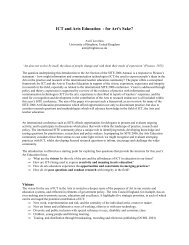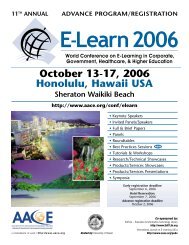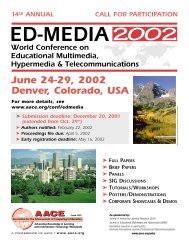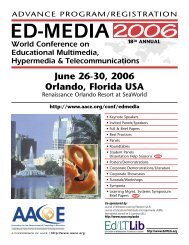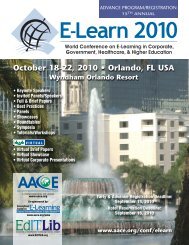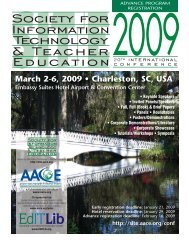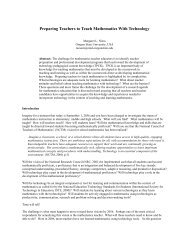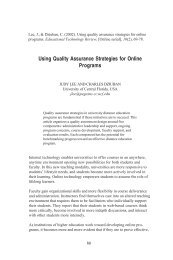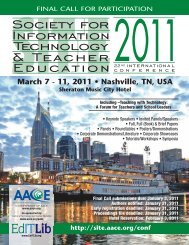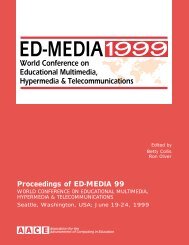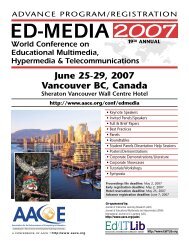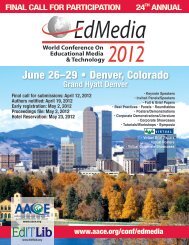ED-MEDIA 1999 Proceedings Book - Association for the ...
ED-MEDIA 1999 Proceedings Book - Association for the ...
ED-MEDIA 1999 Proceedings Book - Association for the ...
You also want an ePaper? Increase the reach of your titles
YUMPU automatically turns print PDFs into web optimized ePapers that Google loves.
<strong>the</strong> classroom.<br />
The project will be evaluated in several ways. First, a standard instrument <strong>for</strong> evaluating <strong>the</strong> graduate and undergraduate<br />
courses will be applied. However, in addition to this standard evaluation, feedback with respect to specific components of a<br />
course or workshop will be solicited from <strong>the</strong> students. Fur<strong>the</strong>rmore, <strong>the</strong> instructors will use a self evaluation <strong>for</strong>m following<br />
each lesson in order to determine from <strong>the</strong>ir perspective what was effective in <strong>the</strong> lesson and what was not. The in-service<br />
teachers will be required to complete similar self evaluations following each workshop. The views and recommendations of<br />
in-service teachers cooperating with <strong>the</strong> undergraduate students= field experience will also be sought.. These evaluations<br />
should provide, at minimum, indirect evidence with respect to <strong>the</strong> effectiveness of <strong>the</strong> project and its effect upon students in<br />
<strong>the</strong> partnering K-12 classrooms. Part of our estimation of success of <strong>the</strong> project will be evaluated according to <strong>the</strong> feedback<br />
received from <strong>the</strong> pre-service and in-service teachers.<br />
Since all <strong>the</strong> courses are part of <strong>the</strong> academic program, <strong>the</strong> pre-service teachers will be evaluated according to <strong>the</strong><br />
per<strong>for</strong>mance and planning of <strong>the</strong>ir technology related lessons. The undergraduate course is a professional development<br />
course and students are required to plan and present mini lessons. Rubrics that address <strong>the</strong> use of technology have already<br />
been developed <strong>for</strong> a graduate course <strong>for</strong> in-service teachers. These rubrics can easily be adapted <strong>for</strong> <strong>the</strong> evaluation of <strong>the</strong><br />
undergraduate students. In addition with regard to <strong>the</strong> field experience, feedback will be sought with respect to <strong>the</strong> preservice<br />
teachers= technological abilities in a classroom environment. This feedback will be considered in conjunction with<br />
per<strong>for</strong>mance in <strong>the</strong> university classroom.<br />
This project has received initial funding from <strong>the</strong> State of Pennsylvania as a pilot program attempting to facilitate pre-service<br />
and in-service interactions with respect to <strong>the</strong> classroom use of technology. Questions and suggestions with respect to <strong>the</strong><br />
project will be entertained from <strong>the</strong> attendees to this presentation.<br />
Acknowledgements: This project is supported in part by funds from <strong>the</strong> Commonwealth of Pennsylvania’s Link to Learn<br />
Project.



